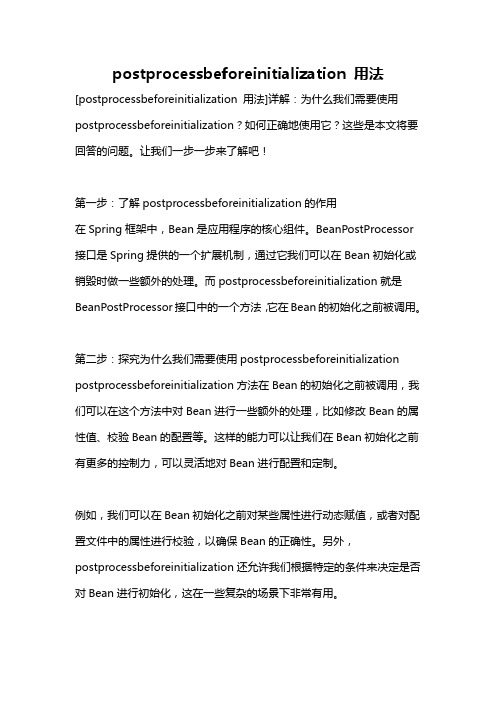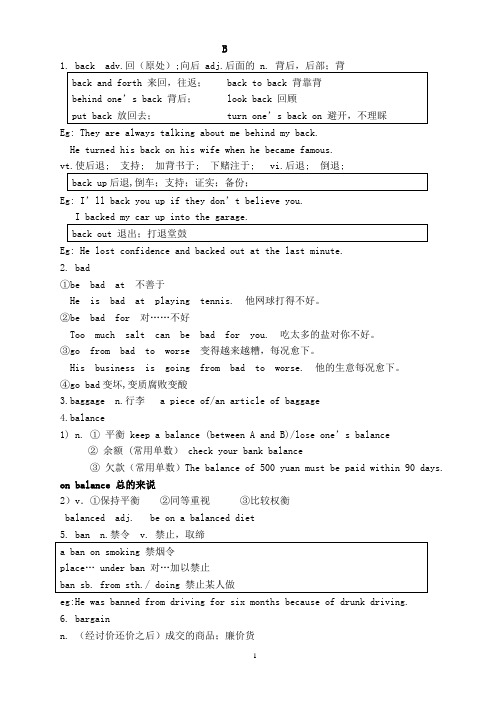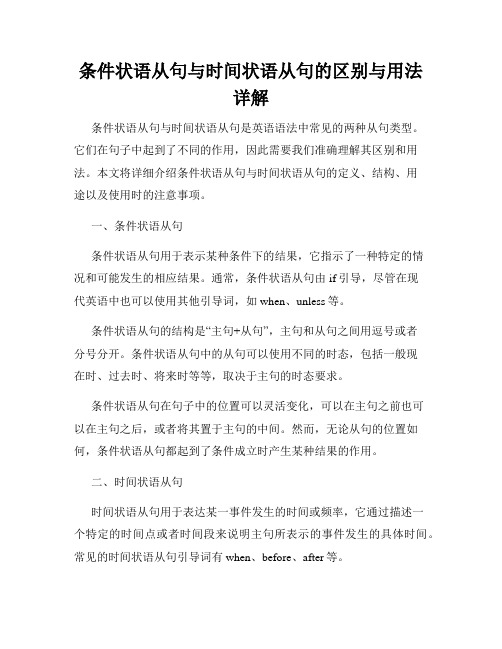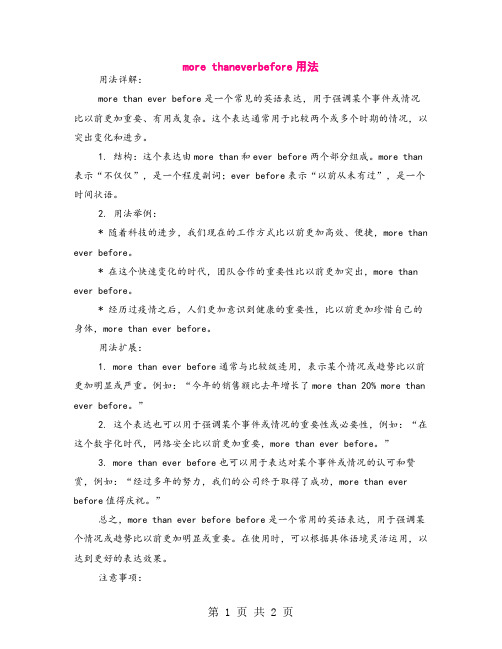详解before用法
postprocessbeforeinitialization 用法

postprocessbeforeinitialization 用法[postprocessbeforeinitialization 用法]详解:为什么我们需要使用postprocessbeforeinitialization?如何正确地使用它?这些是本文将要回答的问题。
让我们一步一步来了解吧!第一步:了解postprocessbeforeinitialization的作用在Spring框架中,Bean是应用程序的核心组件。
BeanPostProcessor 接口是Spring提供的一个扩展机制,通过它我们可以在Bean初始化或销毁时做一些额外的处理。
而postprocessbeforeinitialization就是BeanPostProcessor接口中的一个方法,它在Bean的初始化之前被调用。
第二步:探究为什么我们需要使用postprocessbeforeinitialization postprocessbeforeinitialization方法在Bean的初始化之前被调用,我们可以在这个方法中对Bean进行一些额外的处理,比如修改Bean的属性值、校验Bean的配置等。
这样的能力可以让我们在Bean初始化之前有更多的控制力,可以灵活地对Bean进行配置和定制。
例如,我们可以在Bean初始化之前对某些属性进行动态赋值,或者对配置文件中的属性进行校验,以确保Bean的正确性。
另外,postprocessbeforeinitialization还允许我们根据特定的条件来决定是否对Bean进行初始化,这在一些复杂的场景下非常有用。
第三步:了解postprocessbeforeinitialization的使用方法要使用postprocessbeforeinitialization,我们首先需要实现BeanPostProcessor接口,并实现其中的postprocessbeforeinitialization方法。
初高中英语A部分词汇用法

初高中英语A部分词汇用法英语核心词汇具有特定的内涵和一定的数量,其确定方法也并不复杂,但如何确定英语核心词汇在英汉学习词典里却需要综合考虑多方面的因素。
ability【用法详解】表示有能力做某事或具有做某事的能力等,其后通常要接不定式:She has the ability to speak French fluently.她能流利地说法语。
但在现代英语中,也可后接 of doing sth(不如接不定式普遍,建议初学者谨用):I admire his ability of doing the work quickly.我羡慕他工作做得快。
able【用法详解】1. 表示“有能力的”、“能干的”,可用作表语或定语:He is an able manager.他是位有能力的经理。
2. 用于 be able to do sth(能或会做做某事):I will not be able to come tomorrow.我明天来不了。
注意:be able to 不仅有多种时态形式(通常不用于进行时或与 be going to 连用),而且还可以与某些情态动词连用(通常不与 can 连用),甚至还可以有非谓语形式:Since his accident he hasn’t been able to leave the house.自出事之后,他一直未能离开家。
I regret not being able to help her.我很遗憾未能帮助她。
about【用法详解】1. 表示“大约”,通常用于数字前:It costs about $20.这需 20 美元左右。
2. 在动词 know, hear, speak 等之后用不用介词 about, 含义有差别:She knows him.她认识他。
She knows about him.她知道有关他的情况。
3. be about to (do),意为“即将”、“马上”。
详解before用法(课堂PPT)

5. before表示“与其……宁可……,比……优先”(用于表优 先顺序)
例5: They would fight to death_____ they surrendered(投降).
A. before B. after C. since D. because 解析: 答案为A。before引导的从句在与will, would连
4
2. before表示“不知不觉,还没弄清 就……”(常用于before sb. know/ realize…)
例2: Several weeks had gone by_____ I realized the painting was missing. (2004全国) A. as B. before C. since D. when
平洋航行了两个星期才回到家。”强调从句动作比主句动 作发生晚。又如:
I thought carefully about it before I made a decision. 我经过再三考虑才决定situation improves. 或许要过很多年这种状况才能得到改善。
2
1. before表示“不等……就……”、“尚未……就 ……”
例1: —Why didn’t you tell him about the meeting? (2006年四川)
—He rushed out of the room_____ I could say a word.
A. before B. until C. when D. after 解析:答案为A。题中before意为“不等……就 ”、“尚未……就……”,它表示从句的动作尚未来得 及发生,主句的动作已发生或完成。全句句意为:
过去完成时用法详解

过去完成时用法详解 TYYGROUP system office room 【TYYUA16H-TYY-TYYYUA8Q8-过去完成时用法小结一、过去完成时适用场合1. 过去完成时表示在过去某一时间或动作以前已经完成了的动作。
这个过去的时间常用by,before等介词短语或一个时间状语从句表示,也可以暗含在上下文中。
I had finished my homework before supper.我在晚饭前就把作业做完了。
The play had already started when we got to the theatre. 我们到剧场时戏已经开始了。
By the end of June they had treated over 10,000 patients. 到六月底他们已经治疗了一万多病人。
2. 过去完成时还可表示过去某一时刻之前发生的动作或状态持续到过去某个时间或还要持续下去,常与for,since等词连用。
如:He had served in the army for ten years before he retired last year. 他在部队干了十年,去年退役了。
He told me that he had known her since he was a child. 他告诉我他从小就认识她。
He had learned English for eight years before he went to England for further study. 他在去英国深造前,已学了八年英语。
3. 在一段情景连贯的文字中,先发生的事放在后面叙述时,要用过去完成时。
如:Tom flew home, but his father had already died. 汤姆乘飞机回家,他的父亲却已经去世了。
4. 过去完成时也用于hardly...when...(刚…就…), no sooner...than... (刚…就…),It was the first time + that分句等一些固定句型中。
英语介词用法详解

英语介词是连接名词、代词或名词短语与其他词语的词,它们在句中不能单独作句子成分,需要与它们的宾语一起构成介词短语。
介词的用法多种多样,以下是一些常见英语介词的用法详解:1. 时间介词:- at:表示在某一具体时刻,如“At 6 o'clock”。
- on:表示在具体的某一天或某一天的上午、下午、晚上,如“On Monday”或“On the morning of July 4th”。
- in:表示在一段时间内,如“In the summer”或“In the 20th century”。
- by:表示在某一时间之前,如“By 5 o'clock”。
- before:表示在某一时间之前,如“Before lunch”。
- after:表示在某一时间之后,如“After the meeting”。
- since:表示自从某一时间以来,如“Since last month”。
- until/till:表示直到某一时间为止,如“Until 9 o'clock”或“Till the end of the day”。
2. 地点介词:- at:表示在某一地点,如“At the library”。
- in:表示在某一地区、城市或国家,如“In New York”或“In France”。
- on:表示在某一平面或表面,如“On the table”或“On the floor”。
- above:表示在某一地点的上方,如“Above the clouds”。
- below:表示在某一地点的下方,如“Below the bridge”。
- near:表示靠近某一地点,如“Near the river”。
- between:表示在两者之间,如“Between the trees”。
- beyond:表示超过某一地点,如“Beyond the horizon”。
3. 方式介词:- by:表示通过某种方式或手段,如“By car”或“By phone”。
before的用法归纳总结

before的用法归纳总结“before”在英语中是一个常用的介词和连词,表示时间或顺序上的“在……之前”或“先于”。
以下是“before”的用法归纳总结:作为介词表示时间:用于表示某个事件或动作发生在另一个事件或动作之前。
复制代码She left the office before noon.(她中午之前离开了办公室。
)表示位置:用于表示某个物体或人位于另一个物体或人之前。
复制代码The car in front of me stopped suddenly.(我前面的车突然停了下来。
)与比较级连用:用于表示“在……之前”的比较关系。
复制代码She finished the race before anyone else.(她比其他任何人都先完成了比赛。
)作为连词引导时间状语从句:用于连接两个句子,表示一个事件在另一个事件之前发生。
复制代码We'll go for a walk before dinner.(我们将在晚饭前散步。
)引导条件状语从句:用于表示某个条件必须满足,之后才能发生另一个事件。
复制代码Before you leave, make sure all the lights are off.(你离开之前,确保所有的灯都关了。
)引导让步状语从句:用于表示尽管某个条件存在,但结果仍然如此。
复制代码Before I met her, I had never believed in love at first sight.(在我遇到她之前,我从不相信一见钟情。
)与其他词连用“before long”:表示不久之后,通常用于肯定句中。
复制代码Before long, she will be recovered from the illness.(不久之后,她就会从疾病中恢复过来。
)“ever before”:表示“以前从未”。
复制代码I have never seen such a beautiful sunset before.(我以前从未见过如此美丽的日落。
介词用法详解

介词用法详解介词在英语中起着连接句子成分、表示位置、时间、方式等作用。
正确的使用介词对于掌握英语语法和提高英语表达能力非常重要。
本文将详细解析英语常见的介词用法。
一、在时间表示中的用法1. 表示具体时间点:at- I will meet you at 8 o'clock.- I have an appointment at noon.2. 表示时间段:in- We usually go on vacation in summer.- She finished the report in two hours.3. 表示一段时间之前或之后:before / after- I will call you before dinner.- He arrived after the meeting started.二、在地点表示中的用法1. 表示具体地点:at / in / on- She is waiting for you at the bus stop.- The library is in the city center.- The children are playing on the playground.2. 表示方向:to / towards- I walked to the park.- They ran towards the exit.三、在方式表示中的用法1. 表示方式和手段:by- We traveled to Beijing by train.- He sent the document by email.2. 表示交通工具:on / by- I go to work on foot.- She goes to school by bus.四、在原因和目的表示中的用法1. 表示原因:because of- The game was canceled because of the bad weather. - He couldn't attend the party because of his illness.2. 表示目的:for- I bought a gift for my friend's birthday.- We studied hard for the upcoming exam.五、在其他表示中的用法1. 表示关系:of- The book on the table is mine.- The color of the car is blue.2. 表示所属关系:of- The top of the mountain was covered in snow.- The tail of the dog was wagging happily.总结:介词在英语中有着不同的用法,包括时间、地点、方式、原因和目的等方面。
高中英语学习中须记的句式详解

高中英语学习中须记的句式详解高中英语学习中须记的句式句型1wouldrather that somebodydid…”宁愿……;更情愿……”(表示现在或以后的愿望)wouldrather that somebody had done…”宁愿……;更情愿……”(表示过去的愿望)[例句]I'd rather you postedthe letter right now、我想让您现在去寄信。
I'd rather you were not a celebrated actor、 Inthat case, we could spend more time together、我到情愿您不是个知名演员,如此我们能够有更多的时间在一起。
I'd rather that I hadn't seen her yesterday、我情愿昨天没有看到她。
句型2as if/though+主语+did/had done…好像……(表示现在或以后的情况用过去时;表示过去的情况用过去完成时)[参考句型4][例句]Our head teachertreats us as if we were her own children, so all the students inourclass think highlyof her。
Alan talked about Romeas ifhe hadbeen there、Alan谈起罗马来就好像他去过那儿似的。
句型3"wish +宾语从句",表示不大估计实现的愿望表示现在的愿望:主语+过去时;表示过去的愿望:主语+had done;表示以后的愿望:主语+would/could do[例句]How I wish we students hadmore free tim eto relaxourselves!我们学生多么希望有更多的自由时间放松自己!I failed in the maths exam、 How I wish I hadn't wasted so much time playing!What a pity you can't go to the party。
中考英语考点梳理:过去完成时语法详解!

一. 过去完成时的概念与结构概念:表示在过去某一时间或动作之前已经发生或完成了的动作,即“过去的过去( past-in-the-past )”。
构成:“助动词 had + 过去分词”,其中 had 通用于各种人称。
They had already had breakfast before they arrived at the hotel.在到达旅馆之前,他们已经吃过了早饭。
She had finished writing the composition by 10:00 this morning. 今天早晨10点之前,她已经写完了作文。
二. 过去完成时的用法用法 1.表示一个动作或状态在过去某一时间或动作之前已经完成或结束,即发生在“过去的过去”。
例如:When I woke up, it had stopped raining.我醒来时,雨已经停了。
(雨停发生在醒来之前,即“过去的过去”)用法2. 表示某一动作或状态在过去某时之前已经开始,一直延续到这一过去时间,而且动作尚未结束,仍然有继续下去的可能。
例如:By the end of last year, he had worked in the factory for twenty years. 到去年年底为止,他已经在这个工厂工作了20年。
(到去年年底为止已工作了 20 年,还有继续进行下去的可能)三. 过去完成时的判断依据1. 由时间状语来判定一般说来,各种时态都有特定的时间状语。
与过去完成时连用的时间状语有:(1)by + 过去的时间点,例如:I had finished reading the novel by nine o'clock last night.到昨天晚上九点钟为止,我已经读完了这本小说。
(2)by the end of + 过去的时间点,例如:We had learned over two thousand English words by the end of last term.到上学期末为止,我们已经学了两千多单词。
b组单词详解

BEg: They are always talking about me behind my back.He turned his back on his wife when he became famous.Eg: I’ll back you up if they don’t believe you.Eg: He lost confidence and backed out at the last minute.2. bad①be bad at 不善于He is bad at playing tennis. 他网球打得不好。
②be bad for 对……不好Too much salt can be bad for you. 吃太多的盐对你不好。
③go from bad to worse 变得越来越糟,每况愈下。
His business is going from bad to worse. 他的生意每况愈下。
④go bad变坏,变质腐败变酸3.baggage n.行李 a piece of/an article of baggage4.balance1) n. ① 平衡 keep a balance (between A and B)/lose one’s balance② 余额 (常用单数) check your bank balance③ 欠款(常用单数)The balance of 500 yuan must be paid within 90 days. on balance 总的来说2)v.①保持平衡②同等重视③比较权衡balanced adj. be on a balanced dieteg:He was banned from driving for six months because of drunk driving.6. bargainn. (经讨价还价之后)成交的商品;廉价货eg:Those shoes are a real bargain at such a low price.v. 讨价还价 bargain with sb about /over sth7.A barking dog seldom bites.吠犬不咬人。
英语介词用法详解(初中)

英语介词用法详解(初中)介词是一种虚词,不能独立充当句子成分,需与动词、形容词和名词搭配,才能在句子中充当成分。
介词是用于名词或代词之前,表示词与词之间关系的词类,介词常与动词、形容词和名词搭配表示不同意义。
介词短语中介词后接名词、代词或可以替代名词的词(如:动名词v-ing).介词后的代词永远为宾格形式。
一、表示时间的介词(一)表示时间段的介词(1)in , afterin +时间段,表示从现在起往后推算一段时间after +时间段,表示过去某时间往后推算一段时间,如:He’ll come back in two days. 但点钟用after( after three o’clock)He left on July 2 and returned after three days.(2)in , during表示在一段特指的时间内,可用in 或duringThe work was done in / during the holidays.表示年份、月份、季节用in , 如:in 1999 ,in June , in winter(3)in last, for the past + 时间段, during表示在最近一段时间内,句中谓语动词常用现在完成时I have been in Shanghai in the last few years.(4)for 表示延续一段时间。
I’ll study in the U.S for two yearsI’ve waited for Bingo for half an hour.(二)表示某一时间的介词(1)at, onat 表示某一时刻,on 表示某一天或日期, 如:at 7:14, on Saturday morning on the night of May2一天内各段时间表达, 选用正确的介词,请比较:in the morningon a winter / snow / cold / morningat nighton the night of March 7thin the eveningon Friday evening(2)before, bybefore 表示某一时间之前,而by 表示到某一时间止,句中谓语动词多用完成时态。
初三英语中考语法详解(26)later 与 after,ago 与 before用法词义辨析

初三英语中考语法考点重难点详解(26)later 与after,ago 与before用法词义辨析因为词义相近,很多人分不清later 与 after,ago 与 before,要搞清楚他们的区别,关键得看用法。
1. later 与 after 最大的区别应该是:after 可以做连词,引导时间状语从句,而 later 只是个副词。
(1)时间段 + later:常用于过去,表示“稍后、......之后”A few minutes later, the the boss came in with my bag.几分钟之后,老板拿着我的包进来了。
later 也可以单独用,表示“从现在开始的以后”I will tell you later. 我以后会告诉你的。
表达一段时间之后表达一段时间之后,如果用在一般过去时,可以用:时间段+later,也可以用:after+时间段,例如:Two hours later, Jcak came back with an axe. 两小时之后,杰克拿着一把斧头回来了。
After two weeks later, they were both arrested. 两周之后,两个人都背逮捕了。
如果用在一般将来时,用in+时间段,例如:I will go to London in two weeks. 我两周之后去伦敦。
(2)after+时间点、时间段都可以, 多用于过去After 2 o'clock, they started to climb.两点过后,他们开始攀登。
After so many years in the US, he has changed a lot.在美国生活多年之后,他变了很多。
You mustn't come home after 10:30.你不准十点半之后才回家。
表示某时间点之后表示某时间点之后用:after+时间点after ten o'clock:十点之后after April 23rd:4月23号之后(3)after 可以引导从句,later 不能。
it will not be long before的用法

it will not be long before的用法摘要:I.简介- 引入"it will not be long before" 的用法II.用法详解- 含义:表示不久之后,很快就会发生某事- 构成:主语+ 谓语+ "it will not be long before" + 句子- 常见用法:1.用于将来时态2.用于转述别人的话或想法3.用于表示期待或预测III.例句- 用于将来时态的例句- 用于转述别人的话或想法的例句- 用于表示期待或预测的例句IV.结论- 总结"it will not be long before" 的用法正文:"It will not be long before" 是一个常用的英语短语,表示不久之后,很快就会发生某事。
这个短语可以用于各种场景,让我们的表达更加生动和具体。
下面我们将详细介绍这个短语的用法。
首先,我们来看一下这个短语的构成。
通常,"it will not be long before" 后面会跟着一个句子,用来表示即将发生的事情。
例如:"It will not be long before we arrive at the airport."(我们很快就会到达机场。
)在这个例子中,"it will not be long before" 表示对未来事件的预期。
"It will not be long before" 常见用法之一是用于将来时态。
当我们想要表达将来某个时间点或某件事情会发生时,可以使用这个短语。
例如:"It will not be long before the sun sets."(太阳很快就会落山。
)在这个例子中,"it will not be long before" 表达了日落这一事件即将发生。
条件状语从句与时间状语从句的区别与用法详解

条件状语从句与时间状语从句的区别与用法详解条件状语从句与时间状语从句是英语语法中常见的两种从句类型。
它们在句子中起到了不同的作用,因此需要我们准确理解其区别和用法。
本文将详细介绍条件状语从句与时间状语从句的定义、结构、用途以及使用时的注意事项。
一、条件状语从句条件状语从句用于表示某种条件下的结果,它指示了一种特定的情况和可能发生的相应结果。
通常,条件状语从句由if引导,尽管在现代英语中也可以使用其他引导词,如when、unless等。
条件状语从句的结构是“主句+从句”,主句和从句之间用逗号或者分号分开。
条件状语从句中的从句可以使用不同的时态,包括一般现在时、过去时、将来时等等,取决于主句的时态要求。
条件状语从句在句子中的位置可以灵活变化,可以在主句之前也可以在主句之后,或者将其置于主句的中间。
然而,无论从句的位置如何,条件状语从句都起到了条件成立时产生某种结果的作用。
二、时间状语从句时间状语从句用于表达某一事件发生的时间或频率,它通过描述一个特定的时间点或者时间段来说明主句所表示的事件发生的具体时间。
常见的时间状语从句引导词有when、before、after等。
时间状语从句的结构也是“主句+从句”,从句可以使用不同的时态来表示不同的时间关系。
比如,当主句表示的事件发生在过去时,时间状语从句可以使用过去的时态,如一般过去时、过去完成时等等。
与条件状语从句不同的是,时间状语从句通常紧跟在主句之后,并用逗号或者分号与主句分开。
时间状语从句直接修饰主句,用来说明主句的时间情景。
三、条件状语从句与时间状语从句的区别虽然条件状语从句和时间状语从句在结构上很相似,但是它们却有着明显的不同之处。
首先,条件状语从句与时间状语从句的功能不同。
条件状语从句用于表示某种条件下的结果,它描述了一种情况和可能发生的结果。
而时间状语从句用于描述事件的时间或频率,它强调了主句所表示的事件发生的具体时间。
其次,条件状语从句和时间状语从句在词性上也有区别。
英语介词详解

英语介词详解
介词在英语中是一种虚词,用于表示名词或代词与句子其他部分之间的关系。
以下是介词的详细解释:
1.定义:介词是用于描述名词或代词与句子其他部分之间关系的词。
它们通常
放在名词或代词之前,表示方向、位置、时间、方式等。
2.功能:介词的主要功能是帮助建立名词或代词与其他句子成分之间的关系,
提供更多的语境和背景信息。
3.常见介词:以下是一些常见的英语介词:at、in、on、by、with、about、
over、before、after、during等。
4.用法:介词的用法非常灵活,需要根据上下文和语境来判断。
例如,在句子
“The book is on the table”中,介词“on”表示“在……上面”;在句子“I will meet you at the train station”中,介词“at”表示“在……
地方”。
5.注意事项:使用介词时需要注意一些常见错误,如多余的介词、缺少介词或
使用不当的介词等。
正确使用介词可以提高英语表达的准确性和流畅性。
介词是英语中一个非常重要的语言元素,正确使用介词可以帮助我们更好地表达思想,建立句子之间的关系,提高语言的质量。
more thaneverbefore用法

more thaneverbefore用法用法详解:more than ever before是一个常见的英语表达,用于强调某个事件或情况比以前更加重要、有用或复杂。
这个表达通常用于比较两个或多个时期的情况,以突出变化和进步。
1. 结构:这个表达由more than和ever before两个部分组成。
more than 表示“不仅仅”,是一个程度副词;ever before表示“以前从未有过”,是一个时间状语。
2. 用法举例:* 随着科技的进步,我们现在的工作方式比以前更加高效、便捷,more than ever before。
* 在这个快速变化的时代,团队合作的重要性比以前更加突出,more than ever before。
* 经历过疫情之后,人们更加意识到健康的重要性,比以前更加珍惜自己的身体,more than ever before。
用法扩展:1. more than ever before通常与比较级连用,表示某个情况或趋势比以前更加明显或严重。
例如:“今年的销售额比去年增长了more than 20% more than ever before。
”2. 这个表达也可以用于强调某个事件或情况的重要性或必要性,例如:“在这个数字化时代,网络安全比以前更加重要,more than ever before。
”3. more than ever before也可以用于表达对某个事件或情况的认可和赞赏,例如:“经过多年的努力,我们的公司终于取得了成功,more than ever before值得庆祝。
”总之,more than ever before before是一个常用的英语表达,用于强调某个情况或趋势比以前更加明显或重要。
在使用时,可以根据具体语境灵活运用,以达到更好的表达效果。
注意事项:在使用more than ever before时,需要注意以下几点:1. 不要将其与比较级混淆,more than ever before强调的是某个情况或趋势的对比变化,而比较级则表示两者之间的差异。
- 1、下载文档前请自行甄别文档内容的完整性,平台不提供额外的编辑、内容补充、找答案等附加服务。
- 2、"仅部分预览"的文档,不可在线预览部分如存在完整性等问题,可反馈申请退款(可完整预览的文档不适用该条件!)。
- 3、如文档侵犯您的权益,请联系客服反馈,我们会尽快为您处理(人工客服工作时间:9:00-18:30)。
4. before用于it was / will be + 时间 + before ... 句型中。 例4: It won’t be long_____ you regret what you have done. A. after B. before C. since D.until
解析: It was / will be + 时间 + before ... 表示“过了多久才…(强调时间的长)”, 在否定句中则表示“没过多久就…(强调 时间的短)”。例如: It will be two years before we meet again. 我们要过两年才能见面。 It wasn’t long before he married again. 不久他就又结婚了。 We didn’t wait long before he came back. 我们没等多久他就回来了。
D 1. A scientist must practise_____ he can use all data(数码) tools well. A. as soon as B. when C. until D. before B 2. The next moment,_____ she realized what was happening, she was hit over the head. A. when B. before C. since D. as 3. —Why didn’t you help the little boy? C —Oh, sorry. He had struggled to his feet__________ I ran over. A. until B. after C. before D. since C 4. He made a mistake, but then he corrected the situation_____ it got worse. A. until B.efore表示“与其……宁可……,比……优先”(用于 表优先顺序) 例5: They would fight to death_____ they surrendered(投降). A. before B. after C. since D. because 解析: 答案为A。before引导的从句在与will, would连 用时,有“宁愿……也不”的含义。before即使是作介词 用也有此意义。例如: True men choose death before dishonor. 大丈夫宁可杀不可辱。 I’d die before I apologize to them! 我宁死也不愿向他们道歉! We will die before we give in. 我们宁死不屈。
Before I could get in a word, he had measured me. 我还没有来得及插上话,他就给我 量好了尺寸。 The phone stopped ringing before I answered it. 我还没有来得及接,电话就挂了。
2. before表示“不知不觉,还没弄 清就……”(常用于before sb. know/ realize…) 例2: Several weeks had gone by_____ I realized the painting was missing. (2004全国) A. as B. before C. since D. when
3. before表示“以免,不然” 例3: It’s cloudy. Take an umbrella_____ you regret it. A. but B. and C. after D. before 解析: and及but表示并列关系,不合语境; after意为“在……之后”,不合常识,应是在下 雨前带伞;before在此处意为“以免你后悔”。 before作此意义的用法的例子不少,又如: Put that away before it gets broken. 把它收好,以免砸了。 Do it before you forget. 尽早动手,不然忘了。
解析: 此题最易错选C或D项,而正 确答案为B。用since则时间延续到了 现在,在时间上与had gone矛盾; 用when则无法强调时间流逝的不知 不觉性。又如: Time passed quickly and three months went by before I knew it. 时间飞快地流逝,不知不觉3个月过 去了。
1. before表示“不等……就……”、“尚未……就 ……” 例1: —Why didn’t you tell him about the meeting? (2006年四川) —He rushed out of the room_____ I could say a word. A. before B. until C. when D. after 解析:答案为A。题中before意为“不等…… 就”、“尚未……就……”,它表示从句的动作尚 未来得及发生,主句的动作已发生或完成。全句句 意为:我还没来得及说他就冲出了房间。又如:
6. before表示“……才”(强调从句动作发生得晚或慢) 例6: They sailed along the Pacific Ocean for two weeks_____ they arrived home. A. since B. when C. before D. after 解析: 此题正确答案为C。全句句意为:“他们在太 平洋航行了两个星期才回到家。”强调从句动作比主句动 作发生晚。又如: I thought carefully about it before I made a decision. 我经过再三考虑才决定。 It may be many years before the situation improves. 或许要过很多年这种状况才能得到改善。 7.在某人或物之前
详解before用法
before作为连词时的基本意义是“在 ……之前”,用于表示时间或顺序。如: Turn the light off before you sleep. (睡 前先把灯熄掉。) Think before you speak. (说话之前, 应先想清楚。) 但在不同的语境中before有不同的意义:
